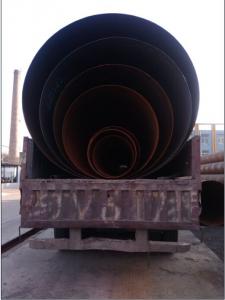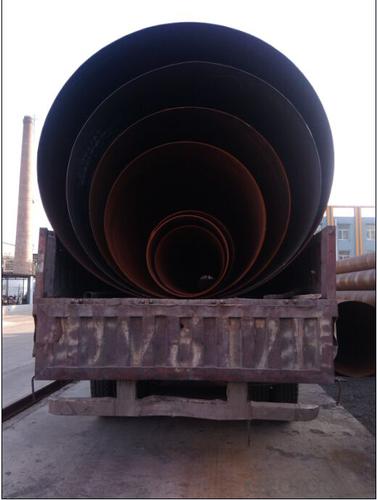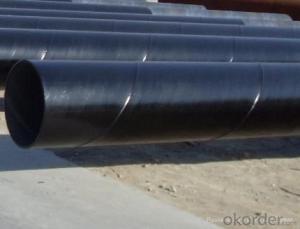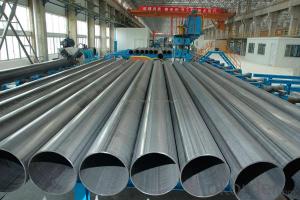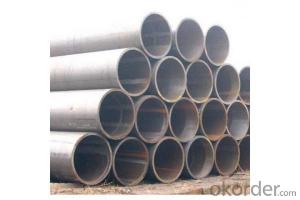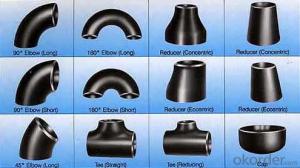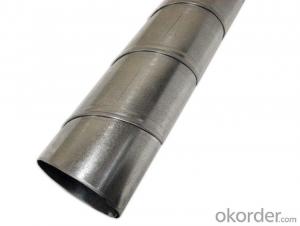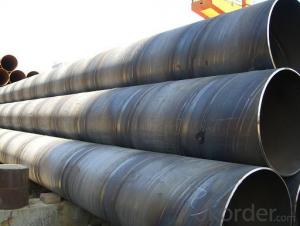SSAW CARBON STEEL PIPE 2''-48'' CNBM PIPE
- Loading Port:
- China Main Port
- Payment Terms:
- TT OR LC
- Min Order Qty:
- -
- Supply Capability:
- -
OKorder Service Pledge
OKorder Financial Service
You Might Also Like
Packaging & Delivery
Packaging Detail: | standard export packing or as customer's requirement |
Delivery Detail: | within 10 - 30 days |
Specifications
Spiral Welded Steel Pipes and Tubes
1.Material:Q195-Q235
2.Length:1-12m
3.WT:1.0-14mm
4.O.D.:20-273mm
Spiral Welded Steel Pipes and Tubes
Product Description:
1.Material : Q235,Q345,L245,L290,L360,L415,L450,L485,GrB,X42,46,X52,X56,X60,X65,X70,X80,X100
2,Standard: SY/T5037-2000,GB/T9711-2011,API Spec 5L PSL1/PSL2,ASTM A252\A53,ISO3183,DIN17172,EN10217,JIS G3457,AWWA C200,ASTM A139,ASTM A671,ASTM A672
3.Wall thickness: 3.0mm-30mm
4.Outer diameter: φ168mm-3020mm
5,Length: 5m-12m or as your requirement
6,Corrosion protection standard: DIN30670,DIN30671, AWWAC210, AWWA C203, SY/T0413-2002,SY/T0414-2002
7,Application: Oil, gas, natural gas, water pipe, thermal electricity pipe, steel structure engineering, etc
Q195-q345 Material Steel Pipe's Materials
Elements | Chemical Compsition% | Mechanical Property | ||||||
| C% | Mn% | S% | P% | Si% | Yield Point (Mpa) | Tensile Strength(Mpa) | Elongation |
Q195 | 0.06-0.12 | 0.25-0.50 | <0.050 | <0.045 | <0.030 | >195 | 315-430 | 32-33 |
Q215 | 0.09-0.15 | 0.25-0.55 | <0.05 | <0.045 | <0.030 | >215 | 335-450 | 26-31 |
Q235 | 0.12-0.20 | 0.30-0.70 | <0.045 | <0.045 | <0.030 | >235 | 375-500 | 24-26 |
Q345 | <0.20 | 1.0-1.6 | <0.040 | <0.040 | <0.55 | >345 | 470-630 | 21-22 |
- Q: What is the process of spiral steel tube production?
- Visual inspection: some basic parameters are checked by professional technicians.6. ultrasonic inspection: 100% inspection of inner and outer weld seam and parent material on both sides of weld seam.
- Q: What are steel pipes used for?
- Steel pipes are used for a wide range of applications in various industries. One of the most common uses of steel pipes is for transporting fluids and gases. They are extensively used in oil and gas pipelines to transport oil, natural gas, and other petroleum products over long distances. Steel pipes are also used in water supply systems, both for domestic and industrial purposes. In the construction industry, steel pipes are used for structural purposes. They provide excellent strength and durability, making them ideal for constructing buildings, bridges, and other infrastructure. Steel pipes are also used in the construction of high-rise buildings, as they can withstand heavy loads and provide stability. Steel pipes are widely used in the manufacturing industry as well. They are used in the production of machinery, equipment, and vehicles. Steel pipes are commonly used for conveying materials such as coal, ore, and grain in bulk handling systems. They are also used in the manufacturing of automotive parts, such as exhaust systems, chassis, and suspension components. Furthermore, steel pipes have various applications in the energy sector. They are used in power plants to transport steam and hot water, as well as in the production and distribution of electricity. Steel pipes are also used in the renewable energy sector, particularly in the construction of wind turbine towers and solar panel frameworks. In addition to these major applications, steel pipes are also used in plumbing systems, irrigation systems, and in the construction of fences and railings. They are highly versatile and can be customized to meet specific requirements in terms of size, thickness, and coating. Overall, steel pipes play a crucial role in many industries and are essential for transporting fluids, constructing infrastructure, and manufacturing various products. Their strength, durability, and versatility make them a preferred choice among engineers and professionals in different fields.
- Q: How do steel pipes perform in extreme weather conditions?
- Steel pipes perform well in extreme weather conditions due to their high strength, durability, and resistance to corrosion. They can withstand extreme temperatures, heavy winds, and harsh climates, making them a reliable choice for various industries and applications.
- Q: What are the different methods of threading steel pipes?
- There are several methods for threading steel pipes, including manual threading using a handheld pipe threader, mechanical threading using a powered threading machine, and hydraulic threading using a hydraulic pipe threader. Additionally, some steel pipes can also be threaded using a die head or a threading lathe.
- Q: What is the role of steel pipes in the transportation of water?
- The role of steel pipes in the transportation of water is to provide a durable and reliable infrastructure for the safe and efficient conveyance of water from its source to various destinations. Steel pipes are known for their strength, corrosion resistance, and ability to withstand high pressure, making them ideal for water transportation systems. These pipes ensure that water is delivered to homes, businesses, and other locations, while maintaining its quality and preventing leaks or contamination.
- Q: What are the applications of galvanized steel pipes?
- Galvanized steel pipes have a wide range of applications across various industries. They are commonly used in plumbing systems for water supply and drainage systems due to their corrosion resistance and durability. Additionally, they are used in the construction industry for structural supports, scaffolding, and fencing. Galvanized steel pipes are also widely utilized in agricultural irrigation systems and in the transportation of liquids and gases.
- Q: How are steel pipes transported?
- Steel pipes can be transported through different means depending on their size, weight, and the distance they need to cover. The primary modes of transportation for steel pipes are trucks, trains, and ships. For shorter distances, trucks are often used to transport steel pipes. The pipes are loaded onto flatbed or specialized trailers designed to securely hold and transport them. Trucks are convenient for transporting steel pipes to nearby locations or construction sites, as they can easily navigate local roads and highways. For longer distances, trains are the preferred mode of transportation. Steel pipes are loaded onto flatcars, which are specifically designed to carry heavy loads. Trains offer a cost-effective and efficient means of transporting large quantities of steel pipes over long distances. They can accommodate pipes of various lengths and diameters, making them a versatile option. When it comes to international shipments or transportation over bodies of water, ships are commonly used. Steel pipes can be loaded into shipping containers or onto the deck of cargo ships. Shipping containers provide protection from weather conditions and ensure the pipes remain secure during transit. Specialized ships equipped with cranes can handle large and heavy pipes, making the transportation of oversized steel pipes possible. In certain cases, pipelines can be constructed to transport steel pipes directly from the manufacturing facility to the desired location. This method is commonly used for oil, gas, or water pipelines. By laying the pipes underground, the need for separate transportation is eliminated. Overall, the transportation of steel pipes involves a range of methods, including trucks, trains, ships, and pipelines. The choice of method depends on factors such as distance, quantity, and project requirements. Each method offers its own advantages and is selected based on considerations such as cost, efficiency, and logistics.
- Q: Can steel pipes be used for gas transmission pipelines?
- Yes, steel pipes can be used for gas transmission pipelines. Steel is a commonly used material for gas pipelines due to its strength, durability, and resistance to corrosion. Additionally, steel pipes can withstand high pressure and temperature conditions, making them suitable for transporting natural gas over long distances.
- Q: How are steel pipes classified based on their wall thickness?
- Steel pipes are classified based on their wall thickness into three categories: standard, extra strong, and double extra strong.
- Q: What is the difference between seamless and welded steel pipes?
- The main difference between seamless and welded steel pipes lies in their manufacturing process. Seamless pipes are made by piercing a solid cylindrical steel billet to create a hollow tube without any welding or joints. On the other hand, welded pipes are formed by rolling a flat steel plate and then welding the edges together to create a cylindrical shape. This welding process introduces a seam along the length of the pipe. Consequently, seamless pipes are typically considered stronger, more reliable, and better suited for high-pressure applications, while welded pipes are more cost-effective and commonly used for less demanding applications.
Send your message to us
SSAW CARBON STEEL PIPE 2''-48'' CNBM PIPE
- Loading Port:
- China Main Port
- Payment Terms:
- TT OR LC
- Min Order Qty:
- -
- Supply Capability:
- -
OKorder Service Pledge
OKorder Financial Service
Similar products
Hot products
Hot Searches
Related keywords
